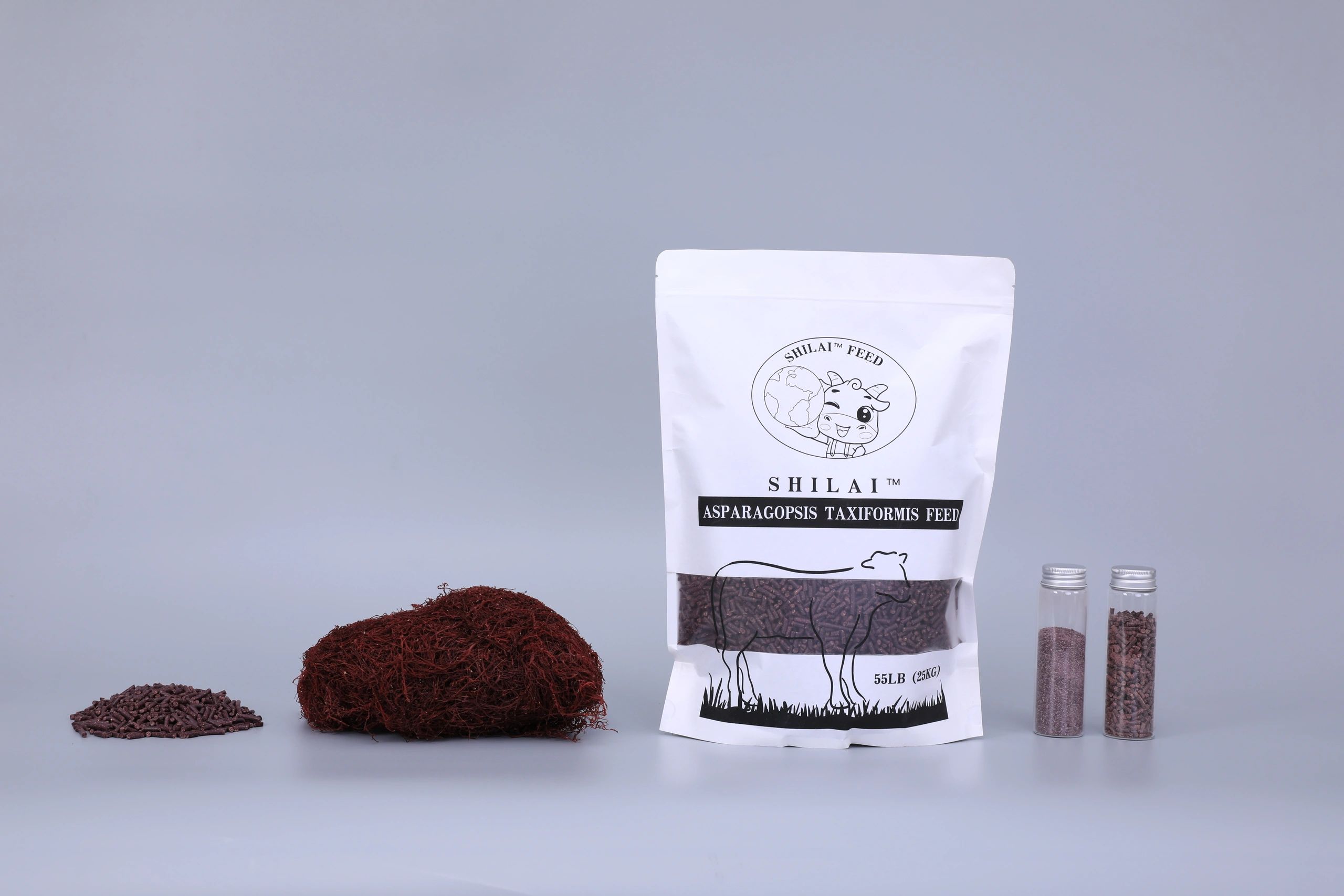Seasonal supply planned Asparagopsis feed pathway for emissions aware farms

Global farming activities are responsible for a large share of greenhouse gas outputs, driven mainly by animal production.
Because methane traps far more heat per molecule than carbon dioxide, its emissions are particularly harmful to the climate.
Asparagopsis taxiformis, a species of red seaweed, is being researched as a promising method to cut livestock methane emissions.
The seaweed’s active substance disrupts microbial methane production in the rumen, cutting animals’ methane emissions.
Adding Asparagopsis taxiformis to feed rations has delivered encouraging trial data that point toward meaningful reductions in livestock methane.
- Additionally, Asparagopsis taxiformis provides further value propositions alongside emissions reductions.
- Elevated animal welfare and condition
- Chance to build circular supply chains around seaweed production
Although additional studies and scale-up work are required, Asparagopsis taxiformis holds strong potential as a durable means to cut livestock emissions.
Exploring the Commercial Promise of Asparagopsis taxiformis Powder as a Feed Ingredient
Using Asparagopsis taxiformis in powdered concentrate form could markedly improve feed solutions for livestock.
This marine plant contains bioactive and nutritional traits that can enhance livestock performance and productivity.
Incorporating A. taxiformis powder into feed blends has been shown to reduce methane emissions in trials while also supplying key micronutrients.
Continued scientific trials are needed to calibrate doses, processing techniques, and longitudinal effects on livestock.
Asparagopsis taxiformis: Toward More Sustainable Livestock Systems

Asparagopsis taxiformis is drawing recognition for its ability to help resolve the environmental impacts of standard animal farming.
Adding the seaweed to rations may deliver substantial methane mitigation and reduce farms’ overall climate impacts.
Evidence shows Asparagopsis can have positive impacts on animal health and productivity alongside emissions reductions.
Additional long-range research and deployment studies are needed, but current trial outcomes are optimistic.
Curbing Enteric Methane via Asparagopsis Feed Inclusion
Research highlights Asparagopsis as a potential, effective way to minimize methane from ruminant animals.
The observed reductions are due to bioactives in the seaweed that disrupt the methanogenic microbes in the rumen.
- Trials and studies have repeatedly observed large methane declines with Asparagopsis supplementation.
- Asparagopsis integration into feed is viewed as a sustainable strategy to reduce agricultural greenhouse gases.
- Ranchers and livestock operators are showing heightened interest in testing Asparagopsis in diets.
Asparagopsis: Seaweed Fueling Sustainable Change in Animal Agriculture
A promising marine-derived solution has appeared, with Asparagopsis taxiformis capable of cutting methane in ruminants.
- Inclusion of the seaweed in animal feeds produced significant methane cuts in research trials with clear climate implications.
- This advancement could support sustainable food systems by reducing emissions without compromising animal nutrition.
As global efforts intensify to find sustainable climate solutions, Asparagopsis stands out as a novel and actionable option for livestock methane mitigation.
Optimizing Feed Formulations with Asparagopsis taxiformis for Greater Methane Cuts
Researchers are working to optimize processing, dosage, and formulation to maximize the methane-cutting efficacy of A. taxiformis.
The Science Behind Asparagopsis taxiformis's Methane-Lowering Effects
Scientists attribute the effect to Asparagopsis compounds that impair the methanogenesis process in the rumen.
Bromoform-type compounds found in Asparagopsis are central to its methane inhibition effect, while scientists examine effects and safety.
Formulating Feeds with Asparagopsis to Support Sustainable Agriculture
Asparagopsis’s nutritional profile and methane-cutting bioactives make it an attractive candidate for inclusion in modern feed formulations.
Incorporating the species into feeds may raise nutrient levels, optimize digestion, and contribute protective antimicrobial actions.
A Sustainable Food System Enabled by Asparagopsis taxiformis
The seaweed is positioned as an innovative, nature-based measure to tackle emissions and improve the sustainability of food supply chains.
- In addition, the seaweed contributes essential nutrients and beneficial compounds to diets.
- Researchers and practitioners are investigating diverse applications of the species across farming and food industries.
Embedding the seaweed in feed strategies could help diminish the overall environmental impact of farming operations.
Asparagopsis Feed Additive: Benefits for Health and Productivity
Asparagopsis is attracting interest as a supplement that can lower methane and concurrently bolster animal health and efficiency.
Use in diets has been associated with improved nutrient absorption and feed conversion, which can support weight gain and overall condition.
Asparagopsis contains compounds with antioxidant and immune-modulating potential that may enhance resilience and reduce disease incidence.
Growing market and regulatory interest in emissions reduction underscores the potential role for Asparagopsis as development continues.
A Sustainable Trajectory: Methane-Cut Feeds Based on Asparagopsis
Facing intensifying expectations to curb emissions, farming may turn to Asparagopsis as part of its mitigation toolkit.
- Scientists explain the effect as the algae’s compounds disrupting the microbial processes responsible for methane production in the rumen.
- Multiple trials have reported encouraging outcomes, with pronounced methane declines in animals fed Asparagopsis.
Asparagopsis-based feeds may enable a transition to more climate-friendly and resilient agricultural practices.